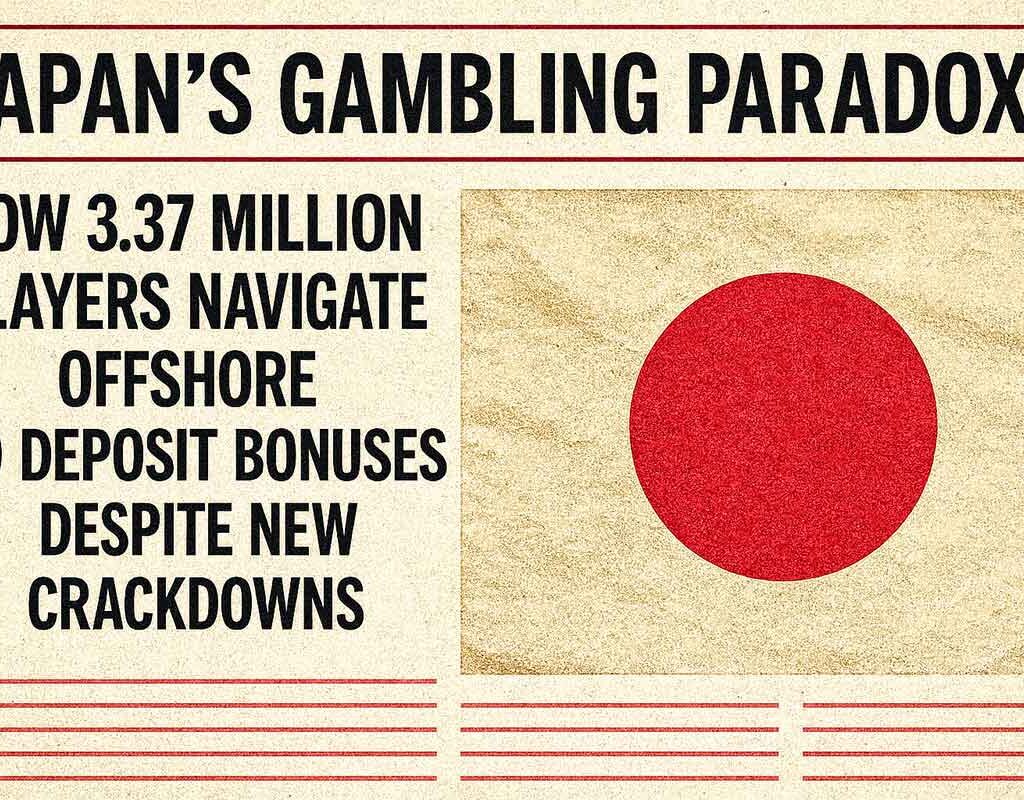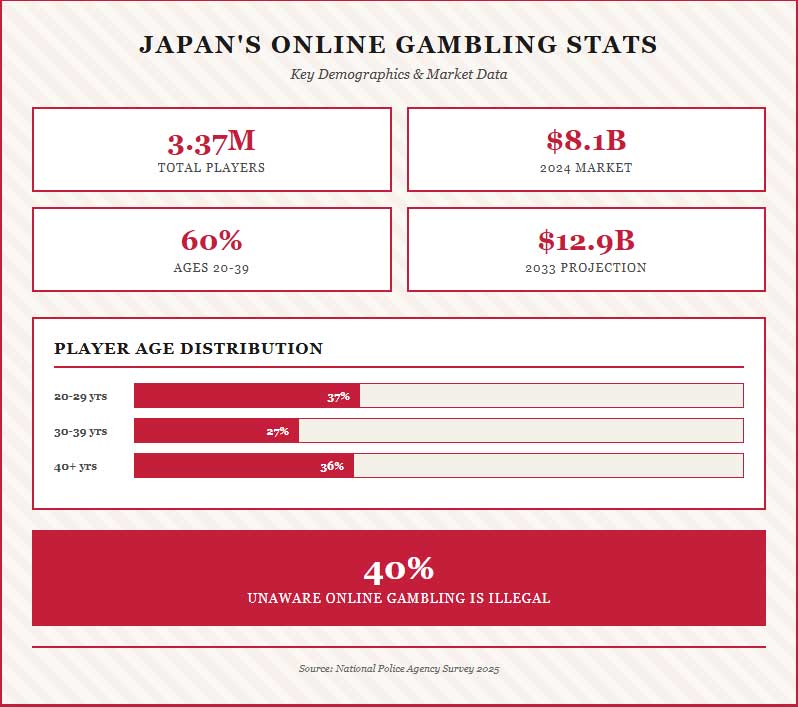The numbers paint a striking picture of modern Japan’s relationship with online gambling. According to a National Police Agency survey earlier this year, approximately 3.37 million people in Japan, of whom nearly 60% were in their 20s and 30s, are estimated to have gambled via online casinos. This massive movement reflects not criminal behavior, but rather millions of ordinary citizens seeking entertainment options that remain legally unavailable domestically.
September 2025 marked a watershed moment in Japan’s approach to online gambling. The revised law, which took effect on Thursday, bans the launch of new online casinos and the posting of online ads for such sites, including on social media. Yet these restrictions have only pushed the industry further underground, potentially creating more risks for the very players authorities claim to protect.
The Reality of Japan’s Thriving Digital Gaming Economy
While online casino operations remain illegal domestically, the Japanese online gambling market (largely offshore) was valued at $8.1 billion in 2024, with projections that it would reach $12.9 billion by 2033, growing at a CAGR of 5.3%. These figures represent not just lost tax revenue, but a massive industry operating without domestic oversight or player protections.
The demographic breakdown reveals an important truth about modern entertainment preferences. Police found that most online casino patrons are aged 30 and below. Forty percent of survey respondents claimed they “did not realize online gambling was illegal.” This widespread participation suggests that current laws are fundamentally disconnected from social reality.
What I’ve found particularly interesting is how offshore operators have invested heavily in creating safe, regulated environments despite operating outside Japan’s jurisdiction. Many hold legitimate licenses from established regulatory bodies, implement responsible gambling tools, and maintain customer service teams fluent in Japanese.
No Deposit Bonuses Democratizing Access to Entertainment
The Evolution of Player-Friendly Offers
Japanese players wager approximately ¥1.24 trillion annually on offshore platforms, often through affiliate channels. No deposit bonuses have emerged as a crucial tool for platforms to build trust with Japanese players who might otherwise hesitate to engage with unfamiliar operators.
These bonuses serve an important function beyond marketing. They allow players to test platforms risk-free, evaluate game fairness, and verify that withdrawals are processed as promised. In many ways, they provide consumer protection that official regulations fail to offer.
The sophistication of these platforms often exceeds what players might expect. Modern offshore casinos serving Japan feature advanced responsible gambling tools, including deposit limits, self-exclusion options, and reality checks. These are features that ironically might not exist if these platforms operated in an unregulated black market.
The Consequences of Prohibition
The current legal framework creates several unintended consequences that harm rather than protect Japanese citizens. By driving gambling underground, authorities have paradoxically reduced their ability to monitor and assist problem gamblers. When activities occur on regulated offshore platforms, at least some consumer protections exist. But complete prohibition could push players toward genuinely dangerous, unregulated options.
If a Japanese resident user accesses foreign online gambling services from within Japan, this may constitute the crime of “gambling” under the Penal Code of Japan. Yet enforcement remains virtually impossible at scale. In 2024, the NPA recorded 162 online casino players and 117 dealers, both of which are record numbers for the country’s gambling statistics. Although only a few hundred iGaming users were officially identified, Japanese police estimate that the total number of players could be around three million.
This massive enforcement gap illustrates a crucial point: prohibition doesn’t eliminate demand; it merely pushes it underground where vulnerable individuals have fewer protections.
The Platform Innovation Response
Reputable offshore platforms have responded to Japanese players’ needs with remarkable innovation. Payment processing, once a major challenge, now includes numerous secure options from cryptocurrency to regional e-wallets. These platforms typically offer 24/7 Japanese language support, culturally appropriate games, and customer service that understands local concerns.
I’ve observed that the best platforms serving Japanese players often exceed international standards for responsible gambling. They implement sophisticated algorithms to identify problem gambling patterns, offer voluntary spending limits, and provide links to support resources. These measures benefit players far more than blanket prohibition.
Finding Quality Platforms in an Uncertain Landscape
Investigators think that 70% of Japanese-language online casinos operate out of the Caribbean island nation of Curaçao. While this might sound concerning, many Curaçao-licensed operators maintain high standards and are subject to regular audits. The key lies in choosing platforms with established reputations and verified licensing.
Japan-101.com has emerged as one of the most trusted sources that curates the best no deposit bonuses currently available to Japanese players. Their comprehensive vetting process examines licensing credentials, payment processing reliability, and actual player withdrawal experiences, providing crucial guidance in navigating this complex landscape.
A More Sensible Path Forward
The prohibition approach clearly isn’t working. Instead of protecting citizens, it’s creating a massive unregulated market where problem gamblers have fewer resources and protections. Countries that have embraced regulation rather than prohibition have demonstrated that legal frameworks can generate tax revenue, fund problem gambling programs, and ensure player protection.
Courts now treat both operators and players involved in unlicensed gambling harshly. Violators may face criminal penalties: organizers up to five years in prison, players up to three. These harsh penalties criminalize millions of ordinary citizens while doing nothing to address the root causes of problem gambling.
Making online gambling illegal hasn’t eliminated it; it’s simply created a huge black market that affects players the most, especially problem gamblers who need support rather than criminalization. These vulnerable individuals now operate in shadows, unable to seek help without fear of legal consequences.
Looking Ahead
The upcoming integrated resorts, with MGM Osaka scheduled for 2030, suggest Japan is slowly recognizing gambling’s inevitability. However, the restrictions these venues will face, including entry fees and visit limitations for locals, indicate authorities still misunderstand the modern digital entertainment landscape.
Meanwhile, offshore platforms continue evolving, offering increasingly sophisticated services that put player protection first. Virtual reality integration, blockchain-based transparency, and AI-powered responsible gambling tools are becoming standard features. These innovations demonstrate what’s possible when platforms compete on service quality rather than operating in legal gray zones.
Conclusion
Japan’s gambling paradox reflects a fundamental disconnect between outdated laws and modern reality. While 3.37 million citizens quietly enjoy online entertainment through offshore platforms, authorities pursue futile crackdowns that may cause more harm than good. The thriving offshore industry, built on no deposit bonuses and player-friendly features, demonstrates that demand for online gambling isn’t disappearing. It’s simply finding safer, more innovative outlets. Perhaps it’s time for Japan to consider whether regulation and taxation might serve its citizens better than prohibition and criminalization.




